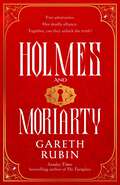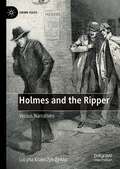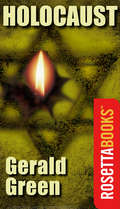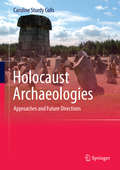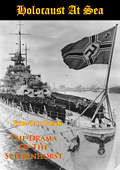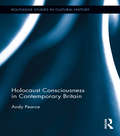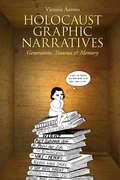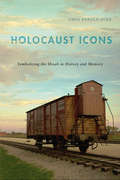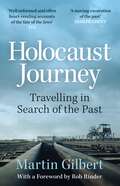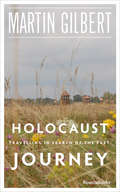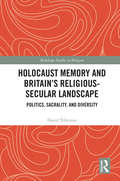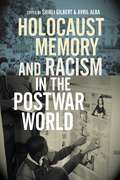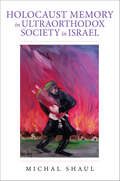- Table View
- List View
Holmes and Moriarty: The new official Sherlock Holmes novel
by Gareth RubinPreorder The Waterfall, the brand new Gareth Rubin novel, coming Autumn 2025.THE CLEVER AND INTRIGUING CRIME MYSTERY FROM THE AUTHOR OF THE INSTANT TOP TEN SUNDAY TIMES BESTSELLER, THE TURNGLASS.A new Sherlock Holmes novel, endorsed by the Conan Doyle Estate. 'A wonderfully entertaining, high-speed, high-stakes adventure with two, no FOUR and more, characters from classic detective fiction! Holmes and Moriarty by Gareth Rubin is the real deal: an accomplished tribute, true to the spirit of Conan-Doyle, but with a thrillingly original story and enough accomplished inventiveness to captivate and satisfy. The perfect fix for Holmes fans - thoroughly recommended!' Janice HallettTwo adversaries. One deadly alliance. Together, can they unlock the truth? Sherlock Holmes and his faithful friend, Dr John Watson, have been hired by actor George Reynolds to help him solve a puzzle. George wants them to find out why the audience who comes to see him perform every night are the same people, only wearing disguises. Is something sinister going on and, if so, what? Meanwhile, Holmes&’ archenemy, Professor James Moriarty is having problems of his own. Implicated in the murder of a gang leader, Moriarty and his second, Moran, must go on the run from the police in order to find out who is behind the set-up. But their investigation puts them in the way of Holmes and Watson and it&’s not long before all four realise that they are being targeted by the same person. With lives on the line, not just their own, they must form an uneasy alliance in order to unmask the true villain. With clues leading them to a hotel in Switzerland and a conspiracy far greater than any of them expected, who can be trusted – and will anyone of them survive? 'Beautifully written and perfectly capturing the Holmesian spirit. And, yes, sometimes I side with Prof. Moriarty, and I don't care who knows it. Love an evil genius . . .' Vaseem Khan 'Holmes and Moriarty is a rip-roaring thriller, fast-paced and twisty as the greatest detective and the greatest criminal become unlikely allies against the most formidable foes' Martin EdwardsPraise for The Turnglass: 'A bold, breathtaking piece of writing that absolutely nails its two books in one conceit. I doubt I'll ever read anything like it again, which is the highest compliment I can offer' Stuart Turton 'A stunning, ingenious, truly immersive mystery. The Turnglass is a thrilling delight' Chris Whitaker 'An intricate and thoroughly mesmerising tale of family plots and schemes across several generations' Guardian
Holmes and the Ripper: Versus Narratives (Crime Files)
by Lucyna Krawczyk-ŻywkoIn versus narratives Sherlock Holmes is fighting or otherwise engaging Jack the Ripper. These texts pit the archetypal detective against the archetypal serial killer using established formulas as well as new narrative and generic features, a combination that results in their mass appeal among authors and audiences alike. The list of primary sources includes 120 titles – novels, short stories, plays, fanfiction, ‘Grand Game’ studies, movies, TV shows, video and board games – which are treated as a dialogic network of transfictional and transmedial texts. This study unpacks the versus corpus in its media dispersal by analysing Sherlock Holmes and Jack the Ripper as serial figures and culture-texts emphasising the increasing palimpsestousness of the former and the multidirectional polymorphousness of the latter, and tracing the overlapping Doylean culture-text. It also addresses the way character constellations are represented, negotiated, and fed back into the versus network, contextualising them within the coalescence of fact and fiction, Gothic and crime fiction frames, cultural memory, neo-Victorianism, and biofiction.
Holocaust
by Gerald GreenThe epic novel of two families and the genocide in Nazi Germany, by the writer of the blockbuster TV miniseries. The Dorfs are &“good&” Germans, loyal to the new Nazi regime, with whom their son Erik, a promising lawyer, finds his ambitions realized with the SS at the side of the ruthless Reinhard Heydrich. The Weisses are Jewish, also &“good&” Germans—but under the new regime, they are doomed. Told through the reminiscences of Erik Dorf, the ambitious SS officer, and the courageous young Jew Rudi Weiss, who ran away from his family as a young boy in an effort to fight the Nazis, this novel takes us through almost every significant event of the Third Reich, from the horrific reality of Kristallnacht to the mass exterminations at Auschwitz. It is a portrait of the extraordinary choices all Germans were forced to make on a daily basis—and the unimaginable consequences if they were wrong. A winner of the Dag Hammarskjöld International Prize, with more than two million copies sold, Holocaust is an unforgettable glimpse into this monumental human tragedy.
Holocaust Archaeologies
by Caroline Sturdy CollsHolocaust Archaeologies: Approaches and Future Directions aims to move archaeological research concerning the Holocaust forward through a discussion of the variety of the political, social, ethical and religious issues that surround investigations of this period and by considering how to address them. It considers the various reasons why archaeological investigations may take place and what issues will be brought to bear when fieldwork is suggested. It presents an interdisciplinary methodology in order to demonstrate how archaeology can (uniquely) contribute to the history of this period. Case examples are used throughout the book in order to contextualise prevalent themes and a variety of geographically and typologically diverse sites throughout Europe are discussed. This book challenges many of the widely held perceptions concerning the Holocaust, including the idea that it was solely an Eastern European phenomena centred on Auschwitz and the belief that other sites connected to it were largely destroyed or are well-known. The typologically , temporally and spatial diverse body of physical evidence pertaining to this period is presented and future possibilities for investigation of it are discussed. Finally, the volume concludes by discussing issues relating to the "re-presentation" of the Holocaust and the impact of this on commemoration, heritage management and education. This discussion is a timely one as we enter an age without survivors and questions are raised about how to educate future generations about these events in their absence.
Holocaust At Sea: The Drama Of The Scharnhorst
by Fritz-Otto BuschOn Christmas Day, 1943, blinded by the fury of an Arctic blizzard, encircled by enemy destroyers, the German battleship Scharnhorst fought for her life.The luck of the Scharnhorst had become a legend. In 1942 she had slipped unscathed through the Channel under the very bows of the British fleet to harry the Arctic convoy-routes. The British convoy which sailed for Murmansk on Christmas Eve, 1943, seemed a perfect target for another lightning raid. In fact it was a trap to lure the battleship into the open and then destroy her.This is the story of the Scharnhorst’s dramatic sortie from her Norwegian lair.The story of a battle fought with outstanding courage against impossible odds until the most feared of all Hitler’s battleships sank at last off North Cape.
Holocaust Cinema in the Twenty-First Century
by Oleksandr Kobrynskyy Gerd BayerIn the first fifteen years of the twenty-first century, a large number of films were produced in Europe, Israel, the United States, and elsewhere addressing the historical reality and the legacy of the Holocaust. Contemporary Holocaust cinema exists at the intersection of national cultural traditions, aesthetic conventions, and the inner logic of popular forms of entertainment. It also reacts to developments in both fiction and documentary films following the innovations of a postmodern aesthetic. With the number of witnesses to the atrocities of Nazi Germany dwindling, medialized representations of the Holocaust take on greater cultural significance. At the same time, visual responses to the task of keeping memories alive have to readjust their value systems and reconsider their artistic choices. Both established directors and a new generation of filmmakers have tackled the ethically difficult task of finding a visual language to represent the past that is also relatable to viewers. Both geographical and spatial principles of Holocaust memory are frequently addressed in original ways. Another development concentrates on perpetrator figures, adding questions related to guilt and memory. Covering such diverse topics, this volume brings together scholars from cultural studies, literary studies, and film studies. Their analyses of twenty-first-century Holocaust films venture across national and linguistic boundaries and make visible various formal and intertextual relationships within the substantial body of Holocaust cinema.
Holocaust Cinema in the Twenty-First Century: Images, Memory, and the Ethics of Representation
by Bayer Gerd Kobrynskyy OleksandrIn the first fifteen years of the twenty-first century, a large number of films were produced in Europe, Israel, the United States, and elsewhere addressing the historical reality and the legacy of the Holocaust. Contemporary Holocaust cinema exists at the intersection of national cultural traditions, aesthetic conventions, and the inner logic of popular forms of entertainment. It also reacts to developments in both fiction and documentary films following the innovations of a postmodern aesthetic. With the number of witnesses to the atrocities of Nazi Germany dwindling, medialized representations of the Holocaust take on greater cultural significance. At the same time, visual responses to the task of keeping memories alive have to readjust their value systems and reconsider their artistic choices.Both established directors and a new generation of filmmakers have tackled the ethically difficult task of finding a visual language to represent the past that is also relatable to viewers. Both geographical and spatial principles of Holocaust memory are frequently addressed in original ways. Another development concentrates on perpetrator figures, adding questions related to guilt and memory. Covering such diverse topics, this volume brings together scholars from cultural studies, literary studies, and film studies. Their analyses of twenty-first-century Holocaust films venture across national and linguistic boundaries and make visible various formal and intertextual relationships within the substantial body of Holocaust cinema.
Holocaust Consciousness in Contemporary Britain (Routledge Studies in Cultural History #27)
by Andy PearceThe Holocaust is a pervasive presence in British culture and society. Schools have been legally required to deliver Holocaust education, the government helps to fund student visits to Auschwitz, the Imperial War Museum's permanent Holocaust Exhibition has attracted millions of visitors, and Britain has an annually commemorated Holocaust Memorial Day. What has prompted this development, how has it unfolded, and why has it happened now? How does it relate to Britain's post-war history, its contemporary concerns, and the wider "globalisation" of Holocaust memory? What are the multiple shapes that British Holocaust consciousness assumes and the consequences of their rapid emergence? Why have the so-called "lessons" of the Holocaust enjoyed such popularity in Britain? Through analysis of changing engagements with the Holocaust in political, cultural and memorial landscapes over the past generation, this book addresses these questions, demonstrating the complexities of Holocaust consciousness and reflecting on the contrasting ways that history is used in Britain today.
Holocaust Education Revisited: Wahrnehmung und Vermittlung • Fiktion und Fakten • Medialität und Digitalität (Holocaust Education – Historisches Lernen – Menschenrechtsbildung)
by Markus Gloe Anja BallisDer Band wendet sich Konzepten von „Holocaust Education“ zu, die auf einer Tagung an der LMU München im Februar 2018 diskutiert worden sind: Wissenschaftlerinnen und Wissenschaftler verschiedener Disziplinen reflektierten über Zieldimensionen, mediale Repräsentationen sowie Wandel und Herausforderungen bei der Vermittlung der Themenfelder Holocaust und NS-Verbrechen. Die kritische Auseinandersetzung mit Konzepten von „Holocaust Education“ hat sich auch im 21. Jahrhundert als produktiv erwiesen: Es kann ein vielstimmiger und auf die Gegenwart bezogener Diskurs entfaltet werden, der von Fragen der Vermittlung im Klassenzimmer bis zu der Virtualisierung von Zeugenschaft in Museen und daraus resultierender didaktischer Konsequenzen reicht. Der InhaltZur Einführung • Wahrnehmung und Vermittlung • Fiktionen und Fakten • Medialität und DigitalitätDie HerausgeberDr. Anja Ballis ist Professorin am Fachbereich Didaktik der deutschen Sprache und Literatur der Ludwig-Maximilians-Universität München.Dr. Markus Gloe ist Professor am Fachbereich Politische Bildung und Didaktik der Sozialkunde an der Ludwig-Maximilians-Universität München.
Holocaust Education in Primary Schools in the Twenty-First Century: Current Practices, Potentials and Ways Forward (The Holocaust and its Contexts)
by Paula Cowan Claus-Christian W. Szejnmann James GriffithsThis collection is the first of its kind, bringing together Holocaust educational researchers as well as school and museum educators from across the globe, to discuss the potentials of Holocaust education in relation to primary school children. Its contributors are from countries that have a unique relationship with the Holocaust, such as Germany, Israel, neutral Switzerland, and Allied countries outside the UK. Their research provides new insight into the diverse ways in which primary aged students engage with Holocaust education. Chapters explore the impact of teaching the Holocaust to this age group, school and museum teaching pedagogies, and primary students’ perspectives of the Holocaust. This book will appeal to school and museum educators of primary aged students whose work requires them to teach the Holocaust, Citizenship (or Civics) or Human Rights Education. Since the turn of the twenty-first century there has been a transformation in school and museum-based Holocaust education. This book clearly demonstrates that primary education has been included in this transformation.
Holocaust Fiction and the Question of Impiety
by David John DicksonThis book discusses the issues underlying contemporary Holocaust fiction. Using Gillian Rose’s theory of Holocaust piety, it argues that, rather than enhancing our understanding of the Holocaust, contemporary fiction has instead become overly focused on gratuitous representations of bodies in pain. The book begins by discussing the locations and imagery which have come to define our understanding of the Holocaust, before then highlighting how this gradual simplification has led to an increasing sense of emotional distance from the historical past. Holocaust fiction, the book argues, attempts to close this emotional and temporal distance by creating an emotional connection to bodies in pain. Using different concepts relating to embodied experience – from Sonia Kruks’ notion of feeling-with to Alison Landsberg’s prosthetic memory – the book analyses several key examples of Holocaust literature and film to establish whether fiction still possesses the capacity to approach the Holocaust impiously.
Holocaust Graphic Narratives: Generation, Trauma, and Memory
by Victoria AaronsIn Holocaust Graphic Narratives, Victoria Aarons demonstrates the range and fluidity of this richly figured genre. Employing memory as her controlling trope, Aarons analyzes the work of the graphic novelists and illustrators, making clear how they extend the traumatic narrative of the Holocaust into the present and, in doing so, give voice to survival in the wake of unrecoverable loss. In recreating moments of traumatic rupture, dislocation, and disequilibrium, these graphic narratives contribute to the evolving field of Holocaust representation and establish a new canon of visual memory. The intergenerational dialogue established by Aarons’ reading of these narratives speaks to the on-going obligation to bear witness to the Holocaust. Examined together, these intergenerational works bridge the erosions created by time and distance. As a genre of witnessing, these graphic stories, in retracing the traumatic tracks of memory, inscribe the weight of history on generations that follow.
Holocaust Heroes: Resistance to Hitler's 'Final Solution'
by Mark FeltonThis inspiring book examines the often incredible and nearly always tragic examples of Jewish resistance in ghettos and concentration camps during the Nazis ‘Final Solution. It shows that the Warsaw Uprising in Poland during April to May 1944 was not the only occasion of defiant opposition. Throughout the Nazis extermination programme Jews and other prisoners fought back against their murderers, often with stunning results. The Germans were nearly always taken by surprise by the sudden emergence of armed Jewish resistance and often paid dearly. This happened in ghettos and concentration campos (including Treblinka, Auschwitz, Syrels and Sobibor) throughout Poland and the Ukraine. Some Jews tried to stop the machinery of the Holocaust by rising up and destroying the gas chambers while others bravely tried to take over an extermination camp and escape en masse. In virtually every case the brave men and women who volunteered to fight back paid with their lives. Importantly these men and women are not just portrayed as victims but also as brave and resourceful fighters and resisters against their tragic fate. These are stories that are uplifting, inspiring and often profoundly moving.
Holocaust History, Holocaust Memory: Jewish Poland and Polish Jews, During and After the Holocaust (Routledge Studies in Second World War History)
by Judith Tydor Baumel-Schwartz Lea GanorThis volume is both a study of the history of Polish Jews and Jewish Poland before, during, and immediately after the Holocaust and a collection of personal explorations focusing on the historians who write about these subjects.While the first three parts of the book focus on "text," the broad nature of Polish Jewish history surrounding the Holocaust, the last section focuses on subtext, the personal and professional experiences of scholars who have devoted years to researching and writing about Polish Jewry. The beginning sections present a variety of case studies on wartime and postwar Polish Jews, drawing on new research and local history. The final part is a reflection on family memory, where scholars discuss their connections to Holocaust history and its impact on their current lives and research. Viewed together, the combination sheds light on both history and historians: the challenges of dealing with the history of an unparalleled cataclysm, and the personal questions and dilemmas that its study raises for many of the historians engaged in it.Holocaust History, Holocaust Memory is a unique resource that will appeal to students and scholars studying the Second World War, Jewish and Polish history, and family history.
Holocaust Holiday: One Family's Descent into Genocide Memory Hell
by Rabbi Shmuley BoteachIn this alternately humorous and horrifying memoir, a Jewish father schleps his reluctant children around Europe on a hard-charging tour of Holocaust sites and memorials in order to impress on them the profound evil of Hitler&’s war against the Jews and the importance of combatting genocide.In 2017, renowned author and celebrity rabbi, Shmuley Boteach, decided to take his family on a European holiday. But instead of seeing the sights of London or Paris, he took his reluctant—and at times complaining—children on a harrowing journey though Auschwitz, Treblinka, Warsaw, and many other sites associated with Hitler&’s genocidal war against the Jews. His purpose was to impress upon them the full horror of the Holocaust so they would know and remember it deep in their bones. In the process, he and his children learn a great deal about the scope and nature of the European genocide and the continuing effects of global hatred and anti-Semitism. The resulting memoir is an utterly unique blend of travelogue, memoir and history—alternately fascinating, terrifying, frustrating, humorous, and tragic. &“It is my honor to contribute a foreword to his important book, in which Rabbi Shmuley Boteach details the excruciating journey he took with his wife and children in the summer of 2017 to the killing fields of Europe, a pilgrimage which every person of conscience should attempt at least once in their lifetime. It is our universal obligation to dedicate ourselves to the memory of the martyred six million, just as it is our obligation to confront and defeat genocide wherever it rises.&” —From the foreword by Amb. Georgette Mosbacher
Holocaust Icons
by Oren Baruch StierThe Holocaust has bequeathed to contemporary society a cultural lexicon of intensely powerful symbols, a vocabulary of remembrance that we draw on to comprehend the otherwise incomprehensible horror of the Shoah. Engagingly written and illustrated with more than forty black-and-white images, Holocaust Icons probes the history and memory of four of these symbolic relics left in the Holocaust's wake. Jewish studies scholar Oren Stier offers in this volume new insight into symbols and the symbol-making process, as he traces the lives and afterlives of certain remnants of the Holocaust and their ongoing impact. Stier focuses in particular on four icons: the railway cars that carried Jews to their deaths, symbolizing the mechanics of murder; the Arbeit Macht Frei ("work makes you free") sign over the entrance to Auschwitz, pointing to the insidious logic of the camp system; the number six million that represents an approximation of the number of Jews killed as well as mass murder more generally; and the persona of Anne Frank, associated with victimization. Stier shows how and why these icons--an object, a phrase, a number, and a person--have come to stand in for the Holocaust: where they came from and how they have been used and reproduced; how they are presently at risk from a variety of threats such as commodification; and what the future holds for the memory of the Shoah. In illuminating these icons of the Holocaust, Stier offers valuable new perspective on one of the defining events of the twentieth century. He helps readers understand not only the Holocaust but also the profound nature of historical memory itself.
Holocaust Impiety in Literature, Popular Music and Film
by Matthew BoswellSurveying irreverent and controversial representations of the Holocaust - from Sylvia Plath and the Sex Pistols to Quentin Tarantino and Holocaust comedy - Matthew Boswell considers how they might play an important role in shaping our understanding of the Nazi genocide and what it means to be human.
Holocaust Journey: Travelling In Search Of The Past
by Sir Martin GilbertIncludes a new foreword by Rob RinderWhat readers are saying about HOLOCAUST JOURNEY:'Brilliant ... A must read for everybody' ⭐⭐⭐⭐⭐'Devastating' ⭐⭐⭐⭐⭐'Fascinating, thought provoking and shocking' ⭐⭐⭐⭐⭐'Everybody should read this' ⭐⭐⭐⭐⭐'Informative and emotional' ⭐⭐⭐⭐⭐In June 1996 Martin Gilbert took a group of students on a two-week journey across middle-Europe which encompassed all the major places in the Holocaust - from Wannsee where the extermination of the Jews was decreed, to the camps themselves, via deserted Jewish communities and synagogues as well as the sites of the ghettos and deportation.'The achievement of Gilbert's HOLOCAUST JOURNEY is to reduce to comprehensible, human terms of the scale of the genocide that to many is still unimaginable' LITERARY REVIEW'Filled with short, well-informed and often heart-rending accounts of the fate of the Jews' TLS'HOLOCAUST JOURNEY travels along the tracks of a history we would rather forget to the sites of wartime horror, and is also a moving excavation of the past' INDEPENDENT
Holocaust Journey: Travelling In Search Of The Past
by Sir Martin GilbertIncludes a new foreword by Rob RinderWhat readers are saying about HOLOCAUST JOURNEY:'Brilliant ... A must read for everybody' ⭐⭐⭐⭐⭐'Devastating' ⭐⭐⭐⭐⭐'Fascinating, thought provoking and shocking' ⭐⭐⭐⭐⭐'Everybody should read this' ⭐⭐⭐⭐⭐'Informative and emotional' ⭐⭐⭐⭐⭐In June 1996 Martin Gilbert took a group of students on a two-week journey across middle-Europe which encompassed all the major places in the Holocaust - from Wannsee where the extermination of the Jews was decreed, to the camps themselves, via deserted Jewish communities and synagogues as well as the sites of the ghettos and deportation.'The achievement of Gilbert's HOLOCAUST JOURNEY is to reduce to comprehensible, human terms of the scale of the genocide that to many is still unimaginable' LITERARY REVIEW'Filled with short, well-informed and often heart-rending accounts of the fate of the Jews' TLS'HOLOCAUST JOURNEY travels along the tracks of a history we would rather forget to the sites of wartime horror, and is also a moving excavation of the past' INDEPENDENT
Holocaust Journey: Travelling in Search of the Past
by Martin Gilbert&“A travelogue, spanning two weeks, of the essential sites of the Holocaust, by the venerable historian and author . . . [A] soul-searching trip&” (Kirkus Reviews). In 1996, prominent Holocaust historian Sir Martin Gilbert embarked on a fourteen-day journey into the past with a group of his graduate students from University College, London. Their destination? Places where the terrible events of the Holocaust had left their mark in Europe. From the railway lines near Auschwitz to the site of Oskar Schindler&’s heroic efforts in Cracow, Poland, Holocaust Journey features intimate personal meditations from one of our greatest modern historians, and is supported by wartime documents, letters, and diaries—as well as over fifty photographs and maps by the author—all of which help interweave Gilbert&’s trip with his students with the surrounding history of the towns, camps, and other locations visited. The result is a narrative of the Holocaust that ties the past to the present with poignancy and power. &“Gilbert . . . is a dedicated guide to this difficult material. We can be grateful for his thoroughness, courage and guidance.&” —Los Angeles Times Book Review
Holocaust Justice: The Battle for Restitution in America's Courts
by Michael J. BazylerThe first book to tell the complete story of the American attempt at restitution for victims of the HolocaustThe Holocaust was not only the greatest murder in history; it was also the greatest theft. Historians estimate that the Nazis stole roughly $230 billion to $320 billion in assets (figured in today’s dollars), from the Jews of Europe. Since the revelations concerning the wartime activities of the Swiss banks first broke in the late 1990s, an ever-widening circle of complicity and wrongdoing against Jews and other victims has emerged in the course of lawsuits waged by American lawyers. These suits involved German corporations, French and Austrian banks, European insurance companies, and double thefts of art—first by the Nazis, and then by museums and private collectors refusing to give them up. All of these injustices have come to light thanks to the American legal system.Holocaust Justice is the first book to tell the complete story of the legal campaign, conducted mainly on American soil, to address these injustices. Michael Bazyler, a legal scholar specializing in human rights and international law, takes an in-depth look at the series of lawsuits that gave rise to a coherent campaign to right historical wrongs. Diplomacy, individual pleas for justice by Holocaust survivors and various Jewish organizations for the last fifty years, and even suits in foreign courts, had not worked. It was only with the intervention of the American courts that elderly Holocaust survivors and millions of other wartime victims throughout the world were awarded compensation, and equally important, acknowledgment of the crimes committed against them. The unique features of the American system of justice—which allowed it to handle claims that originated over fifty years ago and in another part of the world—made it the only forum in the world where Holocaust claims could be heard. Without the lawsuits brought by American lawyers, Bazyler asserts, the claims of the elderly survivors and their heirs would continue to be ignored.For the first time in history, European and even American corporations are now being forced to pay restitution for war crimes totaling billions of dollars to Holocaust survivors and other victims. Bazyler deftly tells the unfolding stories: the Swiss banks’ attempt to hide dormant bank accounts belonging to Holocaust survivors or heirs of those who perished in the war; German private companies that used slave laborers during World War II—including American subsidiaries in Germany; Italian, Swiss and German insurance companies that refused to pay on prewar policies; and the legal wrangle going on today in American courts over art looted by the Nazis in wartime Europe. He describes both the human and legal dramas involved in the struggle for restitution, bringing the often-forgotten voices of Holocaust survivors to the forefront. He also addresses the controversial legal and moral issues over Holocaust restitution and the ethical debates over the distribution of funds.With an eye to the future, Bazyler discusses the enduring legacy of Holocaust restitution litigation, which is already being used as a model for obtaining justice for historical wrongs on both the domestic and international stage.
Holocaust Memory and Britain’s Religious-Secular Landscape: Politics, Sacrality, And Diversity (Routledge Studies in Religion)
by David TollertonBritish state-supported Holocaust remembrance has dramatically grown in prominence since the 1990s. This monograph provides the first substantial discussion of the interface between public Holocaust memory in contemporary Britain and the nation’s changing religious-secular landscape. In the first half of the book attention is given to the relationships between remembrance activities and Jewish, Muslim, Christian, and post-Christian communities. Such relationships are far from monolithic, being entangled in diverse histories, identities, power-structures, and notions of ‘British values’. In the book’s second half, the focus turns to ways in which public initiatives concerned with Holocaust commemoration and education are intertwined with evocations and perceptions of the sacred. Three state-supported endeavours are addressed in detail: Holocaust Memorial Day, plans for a major new memorial site in London, and school visits to Auschwitz. Considering these phenomena through concepts of ritual, sacred space, and pilgrimage, it is proposed that response to the Holocaust has become a key feature of Britain’s 21st century religious-secular landscape. Critical consideration of these topics, it is argued, is necessary for both a better understanding of religious-secular change in modern Britain and a sustainable culture of remembrance and national self-examination. This is the first study to examine Holocaust remembrance and British religiosity/secularity in relation to one another. As such, it will be of keen interest to scholars of Religious Studies, Jewish studies and Holocaust Studies, as well as the Sociology of Religion, Material Religion and Secularism.
Holocaust Memory and National Museums in Britain (The Holocaust and its Contexts)
by Emily-Jayne StilesThis book explores the Holocaust exhibition opened within the Imperial War Museum (IWM) in 2000; setting out the long and often contentious debates surrounding the conception, design, and finally the opening of an important exhibition within a national museum in Britain. It considers a process of memory-making through an assessment of Holocaust photographs, material culture, and survivor testimonies; exploring theories of cultural memory as they apply to the national museum context. Anchored in time and place, the Holocaust exhibition within Britain’s national museum of war is influenced by, and reflects, an international rise in Holocaust consciousness in the 1990s. This book considers the construction of Holocaust memory in 1990s Britain, providing a foundation for understanding current and future national memory projects. Through all aspects of the display, the Holocaust is presented as meaningful in terms of what it says about Nazism and what this, in turn, says about Britishness. From the original debates surrounding the inclusion of a Holocaust gallery at the IWM, to the acquisition of Holocaust artefacts that could act as 'concrete evidence' of Nazi barbarity and criminality, the Holocaust reaffirms an image of Britain that avoids critical self-reflection despite raising uncomfortably close questions. The various display elements are brought together to consider multiple strands of the Holocaust story as it is told by national museums in Britain.
Holocaust Memory and Racism in the Postwar World
by Michael E. Staub Donna-Lee Frieze Tony Kushner Marjorie N. Feld Sarah Phillips Casteel Shirli Gilbert Amos Goldberg Avril Alba Milton Shain Suzanne D. Rutland Dan J. Puckett David Slucki James Jordan Michael Rothberg Bashir Bashir Steven Cooke Dorota GlowackaThe Holocaust is often invoked as a benchmark for talking about human rights abuses from slavery and apartheid to colonialism, ethnic cleansing, and genocide. Western educators and politicians draw seemingly obvious lessons of tolerance and anti-racism from the Nazi past, and their work rests on the implicit assumption that Holocaust education and commemoration will expose the dangers of prejudice and promote peaceful coexistence. Holocaust Memory and Racism in the Postwar World, edited by Shirli Gilbert and Avril Alba, challenges the notion that there is an unproblematic connection between Holocaust memory and the discourse of anti-racism. Through diverse case studies, this volume historicizes how the Holocaust has shaped engagement with racism from the 1940s until the present, demonstrating that contemporary assumptions are neither obvious nor inevitable. Holocaust Memory and Racism in the Postwar World is divided into four sections. The first section focuses on encounters between Nazism and racism during and immediately after World War II, demonstrating not only that racist discourses and politics persisted in the postwar period, but also, perhaps more importantly, that few people identified links with Nazi racism. The second section explores Jewish motivations for participating in anti-racist activism, and the varying memories of the Holocaust that informed their work. The third section historicizes the manifold ways in which the Holocaust has been conceptualized in literary settings, exploring efforts to connect the Holocaust and racism in geographically, culturally, and temporally diverse settings. The final section brings the volume into the present, focusing on contemporary political causes for which the Holocaust provides a benchmark for racial equality and justice. Together, the contributions delineate the complex history of Holocaust memory, recognize its contingency, and provide a foundation from which to evaluate its moral legitimacy and political and social effectiveness. Holocaust Memory and Racism in the Postwar World is intended for students and scholars of Holocaust and genocide studies, professionals working in museums and heritage organizations, and anyone interested in building on their knowledge of the Holocaust and the discourse of racism.
Holocaust Memory in Ultraorthodox Society in Israel (Perspectives on Israel Studies)
by Michal ShaulHow did the Ultraorthodox (Haredi) community chart a new path for its future after it lost the core of its future leaders, teachers, and rabbis in the Holocaust? How did the revival of this group come into being in the new Zionist state of Israel? In Holocaust Memory in Ultraorthodox Society in Israel, Michal Shaul highlights the special role that Holocaust survivors played as they rebuilt and consolidated Ultraorthodox society. Although many Haredi were initially theologically opposed to the creation of Israel, they have become a significant force in the contemporary life and politics of the country. Looking at personal and public experiences of Ultraorthodox survivors in the first years of emigration from liberated Europe and breaking down how their memories entered the public domain, Shaul documents how they were incorporated into the collective memories of the Ultraorthodox in Israel. Holocaust Memory in Ultraorthodox Society in Israel offers a rare mix of empathy and scholarly rigor to understandings of the role that the community's collective memories and survivor mentality have played in creating Israel's national identity.
